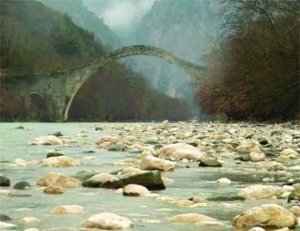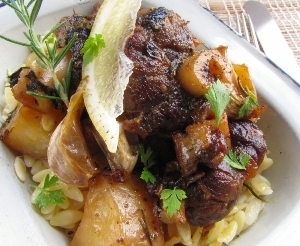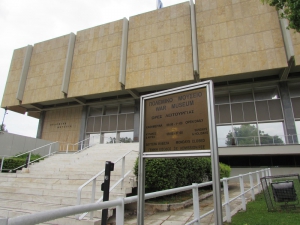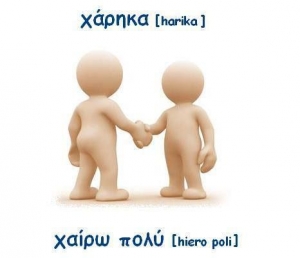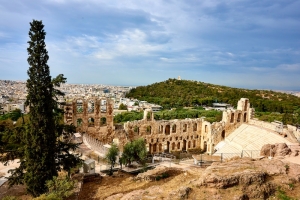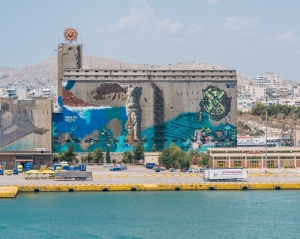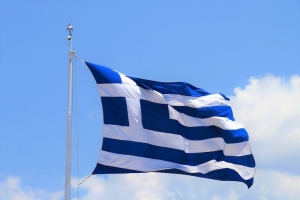It is very common to hear Greeks offering good wishes to each other ~ every occasion has an appropriate wish or good word and is a way to express love, joy, and sympathy.
“Χρόνια πολλά!” [chronia polla] “Many years!” is the most common wish that fits almost all joyful events. You can be sure that saying this greeting for almost every (happy) occassion is just perfect! Apart from this one, however, below you will discover a variety of wishes, for different occasions.
Birthdays
Να ζήσεις! [Na ziseis] – May you live! May you live many and good years!
Να τα εκατοστήσεις! [Na ta ekatostisis] May you live up to a hundred!
Να τα χιλιάσεις! [Na ta chiliasis] – May you become one thousand years old!
Ό,τι επιθυμείς! [Oti epithimis] – Whatever you wish! May you have whatever you want and dream.
Name Day
s
Και του χρόνου! [ke tou chronou] – “And next year!”
May you be well this year as well as next year!
Να χαίρεσαι το όνομά σου! [Na cherese to onoma sou]- May you rejoice your name!
Religious Celebrations
Καλά Χριστούγεννα! [Kala Christougenna] – Merry Christmas!
Καλή Σαρακοστή! [Kali Sarakosti]- Good Lent!
Usually we say this on Ash Monday, and the days after, when the period of fasting for Easter begins (“Sarakosti” < “saranta” = forty)
Καλό Πάσχα! [Kalo Pascha] – Happy Easter!
You will hear this wish during the Holy Week, namely the week before Easter.
Καλή Ανάσταση! [Kali Anastasi]- Happy Resurrection!
Καλό Δεκαπενταύγουστο! [Kalo Dekapentavgousto] – Happy 15th of August!
These wishes are used before the actual holiday, on the day of the feast, the wish used is the popular Χρόνια πολλά! “Many years”.
Illnesses
Περαστικά! [Perastika] – Get Well! May your illness pass quickly!
Σιδερένιος! [Siderenios] – “Iron!” May you be strong as iron again!
Καλή ανάρρωση! [Kali anarosi] – Get well!
New Beginnings During The Year
Καλή εβδομάδα! [Kali evdomada] – (Have a) Good Week!
Every Monday
Καλό μήνα! [Kalo mina] – (Have a) Good month!
1st of every month.
Καλό σαββατοκύριακο! Kalo sabbatokirako : Enjoy your weekend
Καλή χρονιά! [Kali chronia] – Happy New Year!
1st of January and for several days before and after
Καλό καλοκαίρι! [Kalo kalokeri] – Enjoy your summer!
Καλό χειμώνα! [Kalo chimona] – (Have a) Good winter!
Wedding Wishes
Η ώρα η καλή [I ora I kali] – “May your time be good”
May the time of marriage be good and lucky. This is said before the marriage to wish the couple well.
To the newly married couple, we wish:
Να ζήσετε! [Na zisete] – May you live! To live together and enjoy.
Καλούς απογόνους! [Kalous apogonous] – “Good offspring!”
May you have good children.
If you are not married and you find yourself at a wedding celebration, you will probably hear the wish:
Και στα δικά σου! [Kai sta dika sou] – “And to yours!”
May we get together at your wedding!
Also the koumbaro and koumbara receives wishes:
Πάντα άξιος! [Panta aksios] – Always to have such achievements!
Birth Of A Baby
To the parents and grandparents of the newborn we wish:
Να σας ζήσει! [Na sas zisi] – “May he/she live you!”
May your child live a healthy life!
Να είναι τυχερός/-ή! [Na ine ticheros/i] – May he/she be lucky!
Γερό και δυνατό! [Gero ke dinato] – Healthy and strong baby!
Travelling
For someone travelling or ready to leave, you can wish him the following:
Καλό δρόμο!/ Στο καλό! [Kalo dromo!/Sto kalo!] – “Have a safe trip/journey"
Καλό ταξίδι! [Kalo taksidi] – “Have a nice trip!”
= Travel by any means of transport.
Καλή αντάμωση! [Kali antamosi] – “Until we meet again!”
May we meet again.
Καλές διακοπές! [Kales diakopes] – Enjoy your Holidays!
Something New / Something You Bought
Even if someone is buying something, Greeks also use wishes:
Με γεια! [Me gia] – With good health! Enjoy your new acquisition. Usually for clothes and shoes..Also used when you had a haircut!!
Καλορίζικο! [Kaloriziko] – Good luck!
= Used when people buy bigger property (houses, shops), or move to another house.
Καλοτάξιδο! [Kalotaksido] – “Travel well!” =
Similar to the previous, but for means of transport (cars, motorbikes,…).
Death
As in every culture, it is a part of life, with the necessary wishes for relatives of the deceased.
Συλλυπητήρια! [Silipitiria] – Condolences!
Ζωή σε σας! [Zoi se sas] – Life to you!
Να ζήσετε να τον/την θυμάστε! [Na zisete na ton/tin thimaste] – May you live and remember him / her!
Other Common Wishes
Καλή όρεξη! [Kali oreksi] – Enjoy your meal!
Before each meal.
Στην υγειά σου! / Γεια μας! [Stin igia sou / Gia mas] – Cheers!
Καλή διασκέδαση! [Kali diaskedasi] – Have fun! For someone who is preparing to go to a party, theater, cinema etc.
Καλή τύχη!/Καλή επιτυχία! [Kali tichi!/Kali epitichia] – Good luck!
For someone that will do something difficult and important, eg examinations, competition etc.
Καλές δουλειές! [Kales doulies] – “Have a Good Business”
For someone starting a new business, opening a shop…
This article has been provide by Omilo Language and Culture in Greece.
To learn more about them, please click HERE.
Click HERE to see some of their current courses.


